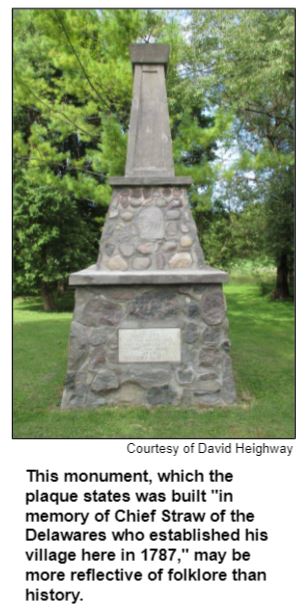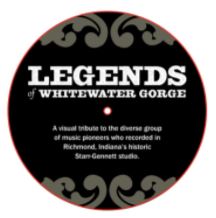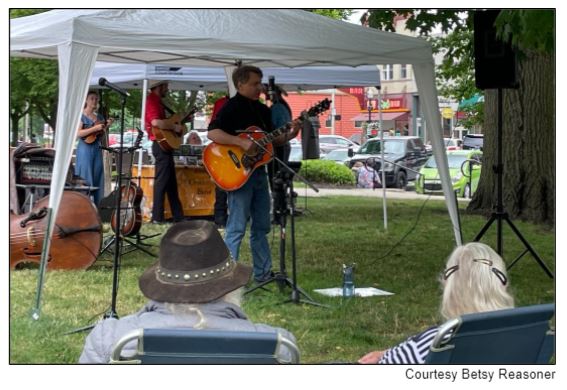Saturdays, noon to 1 p.m. ET on WICR 88.7 FM.
Or stream audio live from anywhere on WICR Online!
July 17, 2021
Strawtown myths: Hamilton County's first murder, Chief Straw and more
One persistent myth about Strawtown is that the village in Hamilton County near the White River came close to being designated the new state capital of Indiana more than 200 years ago.

Still other myths concern a slaying in 1821 that probably was the first murder in Hamilton County. The victim, an early white settler of Madison County, was allegedly killed at a tavern in Strawtown by Native Americans during a clash with an ax-wielding mob of farmers. But historians now doubt several aspects of the narrative about the murder that have persisted for generations.
To sift myths from facts about Strawtown, Hamilton County historian David Heighway will be Nelson's guest.
David has been a guest on several other Hoosier History Live shows, including a program in 2017 about the violent early era of Fishers. David's popular presentations about the rough-and-tumble chapter in Fishers history of the 1870s continually surprise those who regard the suburban city as a sleepy farm town before its explosive growth in recent decades.

Despite the bustle, David emphasizes the total lack of evidence that Strawtown ever was considered as the site for the capital when the southern Indiana city of Corydon, which was the capital when Indiana became a state in 1816, was deemed inconveniently located. State leaders ultimately chose the wilderness site that became the city of Indianapolis.
Notes and records from meetings of state officials - including a consequential session at the cabin of William Conner (the namesake of Conner Prairie Interactive History Park) - do not mention Strawtown, David says. According to persistent myths, Strawtown missed being designated as the capital by a single vote because one of the state commissioners decided to go fishing rather than attend a meeting.
"It's a cute story, but completely untrue," David emphasizes.
Along with other historians, he doubts the existence of Chief Straw. According to folklore, the chief established a Lenape village at Strawtown in the 1780s. (An engraved plaque on the base of the monument identifies 1787 as the founding date.) Those dates began to raise questions among historians, who note that, if Chief Straw truly had arrived then, he would have been one of the first Lenape leaders in the wilderness that eventually became Indiana.
In a 2014 show, Hoosier History Live explored Lenape heritage in the woodlands of central Indiana, which generally lasted from the 1790s until the 1820s. Sometimes called "the most-moved people in American history," the Lenape had been living in New York, New Jersey, Delaware and other east coast states prior to being shoved to the Indiana wilderness. During the 1820s, in what has been called a "forced migration," the tribe was moved from Indiana to Kansas - then, later, to Oklahoma.
Nelson's guests on that show included the executive producer of The Lenape on the Wapahani River, a documentary about the tribe's era in Indiana. "Wapahani" is a Native American name for the White River.
Mick Armbruster performs on Hamilton County Courthouse Square
Our own associate producer Mick Armbruster performed classic folk songs on guitar at the String-Time on the Square concert at the Hamilton County Courthouse on Saturday night, July 10. The show is a production of Legacy Keepers Music, and the next concert in the series will take place July 24 at 6 pm.
Mick played some old tunes by John Prine, the Carter Family, and Bruce Springsteen, among other singer-songwriter types. One audience favorite: a parody of Joni Mitchell's "Both Sides Now" looking at the things we love and hate about cats and dogs.
Mick also plays in the band True North, and will soon have more time to devote to music because sadly he is leaving his position with Hoosier History Live. Molly and Nelson are still in denial about his impending departure from the show, but have begun the process of searching for his replacement. It's a paid position that involves editing our newsletter and website content, as well as our podcasts.
Any creative, techno-savvy individuals out there looking for a gig? See below for more details.
Hoosier History Live seeks to hire part-time editor on a contractual, hourly basis
We need additional editing help! We are looking for someone who edits audio, as we need help with editing our encore shows and podcasts. It's also a big help if you love history, know how to write well and can also do voice-over work.
We also need help with editing our website and newsletter, both of which are expansive. We need people who are self-starters and responsible, who are excited about our unusual project and would like to be part of a creative team.
The show, newsletter and podcasts do not just mysteriously appear out of thin air! There is a lot of work done behind the scenes.
For more specifics about our editing position or positions, email our producer at molly@hoosierhistorylive.org.
Nelson Price, host and historian
Molly Head, producer/general manager, (317) 927-9101
Mick Armbruster, associate producer
Cheryl Lamb, administrative manager
Richard Sullivan, senior tech consultant
Pam Fraizer, graphic designer
Garry Chilluffo, consultant
Please tell our sponsors that you appreciate their support!

 For organizational sponsorship, which includes logos, links, and voiced credits in the show and in podcasts, email molly@hoosierhistorylive.org, or call (317) 927-9101 for information. Our podcast listens are increasing and we are being distributed on Indiana Memory and the National Digital Public Library. Grow with us as our podcast and internet presence expands! Thanks also to Visit Indy, Fraizer Designs, WICR-FM, Henri Pensis, Genesis Brown, Kielynn Tally, Heather McIntyre, Justin Clark, and many other individuals and organizations.
For organizational sponsorship, which includes logos, links, and voiced credits in the show and in podcasts, email molly@hoosierhistorylive.org, or call (317) 927-9101 for information. Our podcast listens are increasing and we are being distributed on Indiana Memory and the National Digital Public Library. Grow with us as our podcast and internet presence expands! Thanks also to Visit Indy, Fraizer Designs, WICR-FM, Henri Pensis, Genesis Brown, Kielynn Tally, Heather McIntyre, Justin Clark, and many other individuals and organizations.
Thank you!
We'd like to thank the following recent, new and renewal contributors whose donations help make this show possible!
- David Yount
- Tom Swenson
- John Stanton
- Kathleen Angelone
- Tim and Meg Shelly
- Ann Frick
- Dr. William McNiece
- Michael Freeland and Sharon Butsch Freeland
- David E. and Lynne J. Steele
- Greg Larson
- Ryan Zumbahlen
- Melissa Martin
Copyright 2021
|







